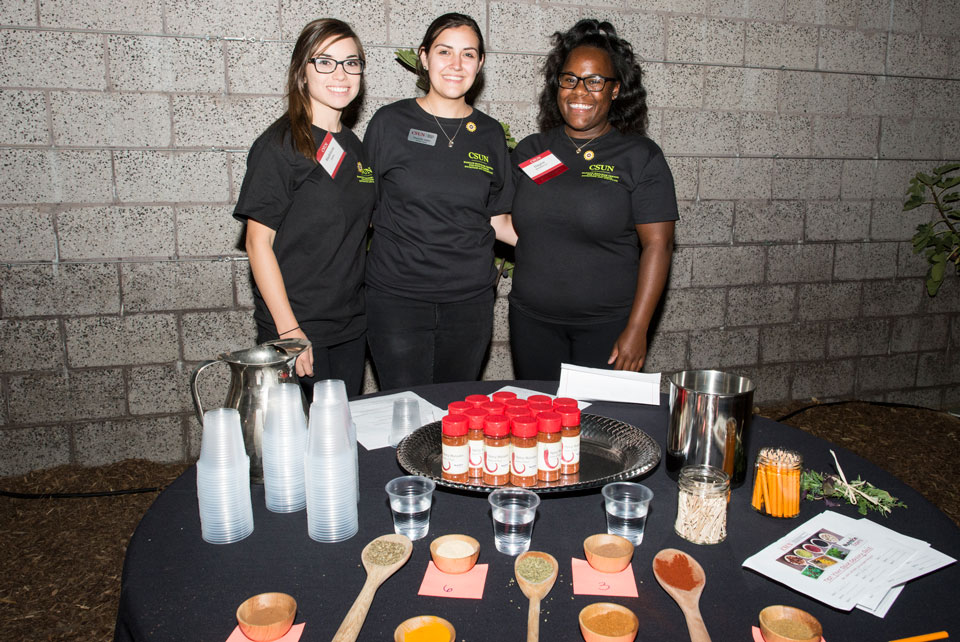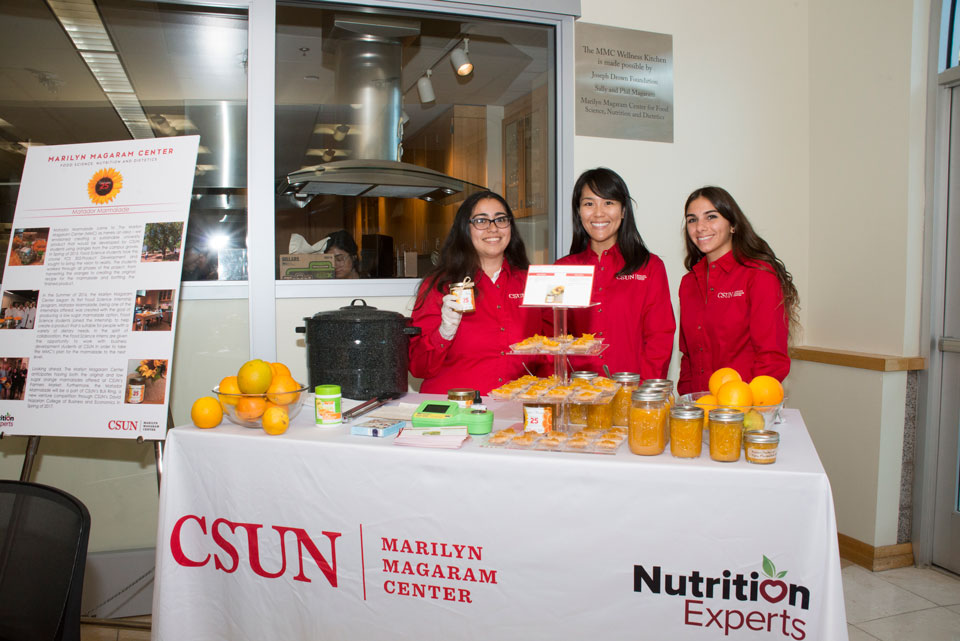CSUN Student Food Scientists Try their Hand at Crafting the Spicy and Sweet
Dayna Middleton, a food science intern at California State University, Northridge’s Marilyn Magaram Center (MMC) for Food Science, Nutrition and Dietetics, spent her entire summer drying rosemary, sage, basil and cilantro, and mixing it with chili powder, cayenne pepper and various other spices in order to find the perfect mixture for an all-purpose seasoning blend.
After more than three months of drying, mixing and researching, the food science senior presented a prototype of the Spicy Matador blend at the MMC’s 25th anniversary celebration on Sept. 15.
“My goal was to make a seasoning for everything,” Middleton said. “We also want to have something available to CSUN students at an affordable price. We’re all college students on a budget. Spices are very expensive, so this can be an all-in-one solution.”
Middleton used herbs provided by the MMC’s new Wellness Garden, located in the interior courtyard in Sequoia Hall. The garden is funded by the Campus Quality Fee and is part of the College of Health and Human Development.
One of the center’s dietetic interns, graduate student Danielle Adler, is working on a marketing and distribution plan to bring Spicy Matador to the CSUN community as a product grown locally and made by the CSUN food science lab.
“[When] you’re grocery shopping, I think the last thing on your list is a $9 spice — most students just go for salt and pepper and call it a day,” said Danielle Adler, a graduate student and dietetic intern. “We wanted to make something that can have a health benefit of not having to add so much salt, and is also affordable for the community.”
Supervised by staff in the MMC, the Spicy Matador project was supported by a CSUN Instructionally Related Activities grant. MMC students, staff and dietetic interns have been involved in the planting, growing, harvesting, drying, packaging and labeling of these products.
Another highlight of the MMC’s anniversary event was the debut of Matador Marmalade, a vision of the MMC leadership and initially developed by food science students in a family and consumer sciences product development course.
“Matador Marmalade was created out of the idea that a product made by students, for students, could generate school spirit and add to the university’s great legacy,” said MMC director Annette Besnilian.
Food science seniors Jennifer Raj and Julie Jordan worked on a low-sugar version over the summer as part of their food science internships at the center.
“Sometimes it would be too clumpy, and we needed to figure out the right ratio for pectin [to fruit],” Jordan said. “[It was a challenge] trying to formulate the recipe to have the right ratios.”
CSUN’s historic Orange Grove provided the Valencia oranges for the zesty marmalade, which makes the product a sustainable food. MMC interns, staff and members of CSUN’s Food Science Association and Student Dietetic Food Science Association hand-picked 130 pounds of oranges from the grove in April.
“Our food science students have made exciting strides in product development,” said Cassie Berger, MMC’s food science internship coordinator. “Our main goal is to offer a quality product created by CSUN students for our community.”
The MMC’s next goal is to sell Spicy Matador and Matador Marmalade at CSUN’s weekly Farmers Market, where the center has been providing frequent food demonstrations.
“We are working with LACI@CSUN to write a business plan and have it on the shelves of the university, the Farmers Market and local supermarkets,” Besnilian said.
Farrell J. Webb, dean of the College of Health and Human Development, said he was particularly impressed with the students’ inventiveness and dedication.
“The students are engaging in a high-impact practice for learning,” he said. “They are involved in every step of the product development process. And the samples were certainly a success with our guests.”
The aspiring food scientists said they were encouraged by the positive response from guests at the center’s anniversary event who tasted both products.
Besnilian added that the students’ work “will support CSUN’s efforts to move closer towards a sustainable campus by sourcing locally.”



 experience
experience